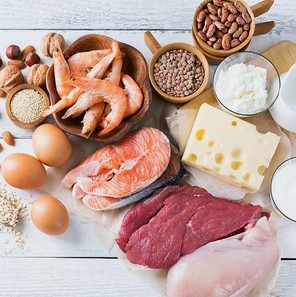Introduction:
Protein is often referred to as the building block of life, playing a crucial role in supporting muscle health, recovery, and overall well-being. Whether you’re an athlete striving for peak performance or simply looking to maintain muscle mass and strength as you age, optimizing your protein intake is essential. In this article, we’ll delve into the importance of protein for muscle health, explore smart choices for protein sources, and provide practical tips for incorporating protein into your diet to maximize your muscle health.
The Role of Protein in Muscle Health:
Protein is composed of amino acids, which are the building blocks of muscle tissue. When you consume protein, your body breaks it down into amino acids, which are then used to repair and rebuild muscle fibers that are damaged during exercise or daily activities. Adequate protein intake is essential for supporting muscle growth, repair, and maintenance, as well as optimizing athletic performance, recovery, and overall muscle health.
Smart Choices for Protein Sources:
- Lean Meats: Lean meats such as chicken breast, turkey breast, lean cuts of beef, and pork loin are excellent sources of high-quality protein. They are low in fat and rich in essential amino acids, making them ideal choices for supporting muscle health and recovery.
- Fish and Seafood: Fatty fish like salmon, tuna, trout, and mackerel are not only rich in protein but also contain omega-3 fatty acids, which have anti-inflammatory properties and support muscle recovery. Incorporating fish and seafood into your diet can help optimize muscle health and overall well-being.
- Dairy Products: Dairy products such as Greek yogurt, cottage cheese, and milk are rich in protein and calcium, which are essential for muscle health and bone density. They also contain whey protein, which is quickly absorbed by the body and ideal for post-workout recovery.
- Eggs: Eggs are a complete source of protein, meaning they contain all nine essential amino acids that the body cannot produce on its own. They are also rich in nutrients like vitamins A, D, and B12, as well as choline, which support muscle health and overall well-being.
- Plant-Based Proteins: Plant-based protein sources such as beans, lentils, chickpeas, tofu, tempeh, and edamame are excellent options for vegetarians and vegans. They are rich in protein, fiber, vitamins, and minerals, and can support muscle health and recovery when incorporated into a balanced diet.

Practical Tips for Incorporating Protein into Your Diet:
- Aim to include a source of protein with each meal and snack to support muscle health and satiety.
- Choose lean protein sources and avoid excessive intake of high-fat cuts of meat and processed meats, which may be detrimental to heart health.
- Experiment with different protein sources to keep your meals interesting and varied, and to ensure you’re getting a wide range of essential amino acids.
- Incorporate protein-rich snacks such as Greek yogurt with fruit, cottage cheese with vegetables, or a handful of nuts and seeds for a quick and satisfying boost of protein.
- Consider timing your protein intake around workouts to optimize muscle recovery and growth, aiming to consume protein-rich foods or supplements within 30 minutes to an hour post-exercise.
Conclusion:
Protein is essential for optimizing muscle health, recovery, and overall well-being. By incorporating smart choices for protein sources into your diet and following practical tips for maximizing your protein intake, you can support muscle growth, repair, and maintenance, as well as enhance athletic performance and recovery. Whether you’re enjoying a grilled chicken salad, sipping on a post-workout protein shake, or snacking on Greek yogurt with fruit, embracing protein perfection can help you achieve your muscle health goals and live a stronger, healthier life.